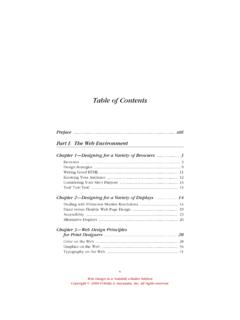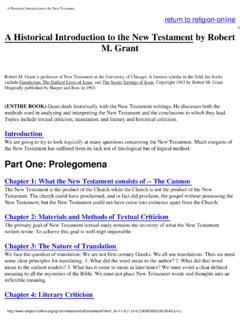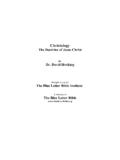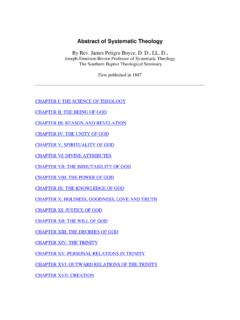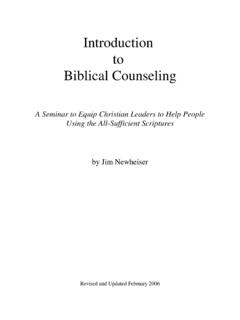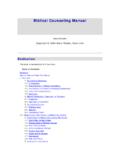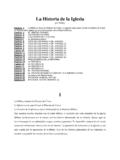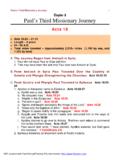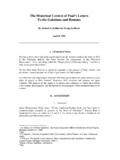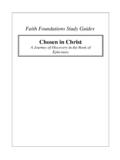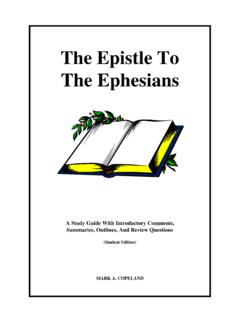Transcription of Epistles of St Paul - The NTSLibrary
1 Epistles of Apostle paul Bishop Alexander (Mileant). Translated by Seraphim Larin Foreword Of all the New Testament holy authors, Apostle paul - having written some 14 Epistles - stands out as being the most prolific in expounding instructions on Christian living. Because of the significance of their contents, they are rightfully regarded as the "second Gospel," attracting attention from both thinkers-philosophers and the ordinary faithful. The Apostles themselves did not ignore the works of their "beloved brother," who was last to convert to Christ, yet equal to them in spirit and sanctified gifts (2 Pet. 3:15-16). Presenting themselves as an important and necessary appendix to the teachings of the Gospel, the Epistles of the Apostle paul should be the subject of an attentive and earnest study of every person that seeks a deeper understanding of the Christian faith.
2 These Epistles are outstanding in their remarkably elevated religious thoughts, reflecting the Apostle paul 's extensive knowledge and scholarship of the Old Testament, which were equal to his profound understanding of Christ's New Testament teachings. In trying to express his deep thoughts and not finding the necessary words in the contemporary Greek lexicon to do this, Apostle paul was compelled to create his own expressions by blending existing words to give them a new meaning. Later, these new words were widely used by Christian writers in their literary works. Correlation between Apostle paul 's teachings and his life The Epistles of Apostle paul are the fruits of his Apostolic endeavors to uncover the teachings of Christ. They are remarkable because the Apostle does not do this in an abstract manner, but rather through a close link with the development of the churches established by him, and through his personal Apostolic labors and personal sufferings.
3 Because the teachings outlined in his Epistles are closely interwoven with his personality, an understanding of his life and character would assist in comprehending them. That is why we shall now acquaint the reader with those aspects of Apostle paul 's life - which he himself pointed out - which served as his source in determining questions relating to the Christian teachings on faith and morality. " For I am the least of the Apostles, who am not worthy to be called an Apostle, because I persecuted the Church of God. But by the grace of God I am what I am, and His grace toward me was not in vain; but I labored more abundantly than they all, yet not I, but the grace of God which was with me" (1 Cor. 15:9-10). This is how this great "Apostle of tongues" characterized himself and who was recorded in the annals of the history of the Christian Church as the "heathen's Apostle.
4 " Endowed from birth with abounding mental capabilities, he was brought up and educated along strict Pharisee principles and by his own words, was more advanced than many of his contemporaries and in his youth, was exceedingly zealous for the traditions of his fathers (Gal. 1:14). Consequently, when God selected him in his mother's womb and called him to Apostolic ministry, he devoted all the energy and towering strength of his great spirit toward preaching in the name of Christ among the heathens. This action forced him to suffer much sorrow from his fellow countrymen that were blinded with disbelief in their animosity toward Christ. In studying the life and works of Saint paul through the Book of Apostolic Acts, it is truly impossible not to be astonished at the extraordinary, inexhaustible energy of this great "Apostle of tongues." It is difficult to imagine how a person lacking in health and physical strength (Gal.)
5 4:13-14), could sustain so many extraordinary hardships and dangers as Apostle paul had to endure, for the glory of Christ. What is especially remarkable is the fact that as these difficulties and dangers grew, instead of his impassioned zeal and energy weakening, they increased and became stronger. Compelled to remember his labors in order to enlighten the Corinthians, the Apostle writes: "Are they ministers of Christ? - I speak as a fool - I am more: in labors more abundant, in stripes above measure, in prisons more frequently, in deaths often. From the Jews five times I received forty stripes minus one. Three times I was beaten with rods; once I was stoned; three times I was shipwrecked; a night and a day I have been in the deep; in journeys often, in perils of waters, in perils of robbers, in perils of my own countrymen, in perils of the Gentiles, in perils in the city, in perils in the wilderness, in perils in the sea, in perils among false brethren; in weariness and toil, in sleeplessness often, in hunger and thirst, in fasting often, in cold and " (2 Cor.
6 11:23-27). In comparing himself to the other Apostles, his humility prompts him to call himself as the "least" among them, even though he would have been fully justified in declaring: "But I labored more abundantly than they all, yet not I, but the grace of God which was with me" (1 Cor. 15:10). Indeed, without God's grace no ordinary human being could undertake such tasks and accomplish so many deeds. As much as Apostle paul presented himself before kings as strong, forthright and unshakeable in his beliefs, so was he decisive and sincere in his relations with his fellow-brother Apostles. Once, in the city of Antioch - capital of the heathens in Asia Minor - he did not hesitate to accuse Apostle Peter of hypocrisy when that Apostle's motive for censure was flawed (Gal. 2:11-14). This fact is also important in that it clearly denounces the false assertion of the Roman Catholics that Apostle Peter was designated by Christ as the "prince above all other Apostles" and as the substitute for Christ Himself (hence the Roman Popes appropriated the title "vicar of the Son of God").
7 Being the last to become an Apostle and having formerly persecuted the Christian Church, would Apostle paul dare to accuse the "substitute" of the Lord Jesus Christ? This is absolutely unlikely. Apostle paul accused Apostle Peter as an equal, as a brother. Life and works of Apostle paul Saint paul , carrying at first his Hebrew name Saul, belonged to the tribe of Benjamin and was born in the Cilician town of Tarsus (in Asia Minor), which was then renowned for its Greek academy and for the scholarship of its citizens. Because he was a native of this city and descended from Jews freed from Roman slavery, paul had the rights of a Roman citizen. paul received his initial education in Tarsus, and probably became familiar with the pagan culture, since his acquaintance with gentile writers is clearly shown in his speeches and writings (Acts 17:28; 1 Cor. 15:33; Titus 1:12).
8 He received his final education in Jerusalem from the famous teacher Gamaliel in the acclaimed rabbinical school. Gamaliel was considered an expert on the law and despite belonging to the party of Pharisees, was a freethinking person (Acts 5:34) and an admirer of Greek wisdom. Here, according to the accepted custom of the Jews, young Saul learned the art of tent-making, which later provided him with the means to live from his own labors (Acts 18:3; 2 Cor. 11:8; 2 Thes. 3:8.). Evidently young Saul was preparing for a rabbinical career, since directly after finishing his education and training he emerged as a strong zealot of pharisaic traditions and persecutor of the Christian faith. Perhaps by the appointment of the Sanhedrin, he was a witness to the death of the first martyr Stephan (Acts 7:58, 8:1) and then received official authority to persecute the Christians beyond the borders of Palestine in Damascus (Acts 9:1-2.)
9 The Lord, seeing in him a "chosen vessel," called him to Apostolic service by miraculous means on the road to Damascus. During his journey, a bright light enveloped Saul, from which he fell to the ground blind. A voice resounded from the light, "Saul, Saul, why do you persecute me?" Saul asked, "Who are you?" Jesus answered, "I am Jesus, Who you are persecuting." The Lord commanded Saul to go to Damascus, where he would be instructed on what to do further. Saul's companions heard the voice of Christ, but they did not see the light. After being led by the arm to Damascus, paul was taught the faith and on the third day was baptized by Ananias. The moment Saul was submerged in the baptismal water, he regained his sight. From that point on, he became a zealous preacher of the teachings he had formerly persecuted. He went to Arabia for a short period and then returned to Damascus to preach about Christ.
10 In 38AD, angered by his conversion to Christ, the vehemence of the Jews forced him to flee to Jerusalem (Acts 9:23), where he joined the community of believers and was introduced to the Apostles. Because of an attempt on his life by the Hellenists, he left for his native Tarsus. From there, around 43 AD, he was called by Barnabas to preach in Antioch, followed by a journey together to Jerusalem, bringing aid to the needy (Acts 11:30.). Soon after his return from Jerusalem, by the direction of the Holy Spirit, Saul and Barnabas left on their first missionary journey, lasting from 45 to 51 AD. The Apostles traveled throughout the entire island of Cyprus, and by the time Saul converted the proconsul Sergius Paulus, he was already known as paul . During the time of paul and Barnabas's missionary journey, Christian communities were founded in the Asia Minor cities of Pisidian, Antioch, Iconium, Lystra, and Derbe.
